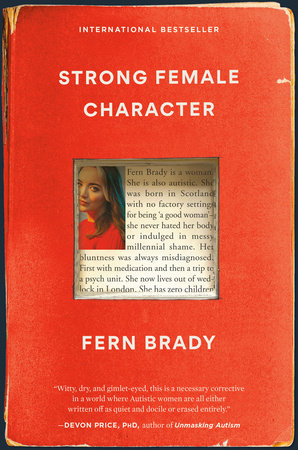Strong Female Character
Fern Brady
Hardcover
June 6, 2023 | ISBN 9780593582503
AmazonBarnes & NobleBooks A MillionBookshop.orgHudson BooksellersPowell'sTargetWalmart
Ebook
June 6, 2023 | ISBN 9780593582510
AmazonApple BooksBarnes & NobleBooks A MillionGoogle Play StoreKobo
About the Book
Scottish comedian Fern Brady was told she couldn't be autistic because she'd had loads of boyfriends and is good at eye contact. In this frank and surreal memoir, she delivers a sharp and often hilarious portrait of neurodivergence and living unmasked.
Finalist for the Porchlight Business Book Award • A Harper’s Bazaar Best Book of the Year
After reading about autism in her teens, Fern Brady knew instinctively that she had it—autism explained her sensory issues, her meltdowns, her inability to pick up on social cues—and she told her doctor as much. But it took until she was thirty-four for her to get diagnosed.
Strong Female Character is about the years in between, and the unique combination of sexism and ableism that so often prevents autistic women from getting diagnosed until adulthood. Coming from a working-class Scottish Catholic family, Fern wasn’t exactly poised to receive an open-minded acceptance of her neurodivergence. With the piercing clarity and wit that has put her at the top of the British comedy scene, she now reflects on the ways her undiagnosed autism influenced her youth, from the tree that functioned as her childhood best friend to the psychiatric facility where she ended up when neither her parents nor school knew what to do with her.
In a memoir as hilarious as it is heartbreaking, Fern leaves no stone unturned while detailing her futile attempts at employment, her increasingly destructive coping mechanisms, and the meltdowns that left her mind (and apartment) in ruins. Her chaotic, nonlinear journey—from stripping to getting arrested to finding a lifeline in comedy to her breakout appearance on the Taskmaster TV show as her full, unmasked self—is both a remarkable coming-of-age tale and a dark but poignant tribute to life at the intersection of womanhood and neurodiversity.
Strong Female Character is a story of how being female can get in the way of being autistic and how being autistic gets in the way of being the 'right kind' of woman.




